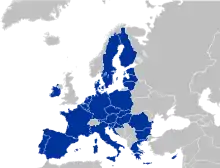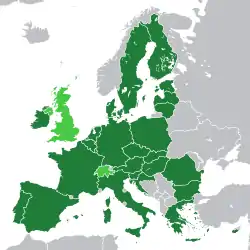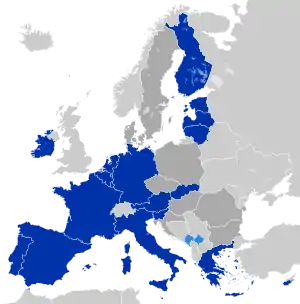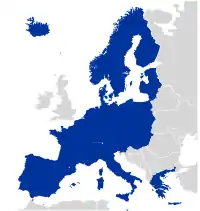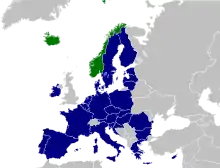G6 (EU)
The G6 (Group of Six) in the European Union is an unofficial group of the interior ministers of the six European Union member states—France, Germany, Italy, Poland, Spain, and the United Kingdom—with the largest populations and thus with the majority of votes in the Council of the European Union. The G6 was established in 2003 as G5 to deal with immigration, terrorism and law and order.[1][2] In 2006, Poland joined the group, making it the G6.
| G6 | ||||
|---|---|---|---|---|
| State | Population | Votes in the Council | Notes | |
| Germany | 83,314,906 | 29 | 8.4% | |
| France | 65,027,000 | 29 | 8.4% | |
| United Kingdom | 63,182,000 | 29 | 8.4% | Left in 2020 |
| Italy | 60,000,068 | 29 | 8.4% | |
| Spain | 47,016,894 | 27 | 7.8% | Joined in 2003 |
| Poland | 38,116,000 | 27 | 7.8% | Joined in 2006 |
| Total | 348,658,527 | 170 | 49.3% | |

 |
|---|
| This article is part of a series on the politics and government of the European Union |
|
|
Under the third pillar of the EU, Police and Judicial Co-operation in Criminal Matters, powers are largely intergovernmental; this is the one EU policy area where there is no Commission monopoly on proposing law.[3] In other policy areas, the commission can usually create balance among the states, but in this one, the G6 has a great deal of influence over the commission.
Nicolas Sarkozy has called on the G6 to lead the Union following the dilution of the Franco-German motor after the 2004 enlargement of the European Union.[4] The lack of transparency and accountability of the G6 has been criticised by a number of figures, notably by a report in 2006 by the UK's House of Lords.[5]
See also
- Area of freedom, security and justice
- Big Four (Western Europe)
- Brexit
- Council of the European Union
- Democratic deficit in the European Union
- European Commission
- EU three
- Group of Seven
- Inner Six
- Intergovernmentalism
- List of European Union member states by population
- Salzburg Forum
- Voting in the Council of the European Union
References
- EU G6 nations agree to fight terrorism and illegal immigration. WorkPermit.com. 27 October 2006.
- Reid urges human rights shake-up. BBC News. 12 May 2007.
- Police and Judicial Co-operation in Criminal Matters: Will the EU Constitutional Treaty Keep it Together, Euractiv.com 08/04/04
- Sarkozy calls for 'G6' to lead EU, Financial Times
- European Union - Fortieth Report, House of Lords, United Kingdom
